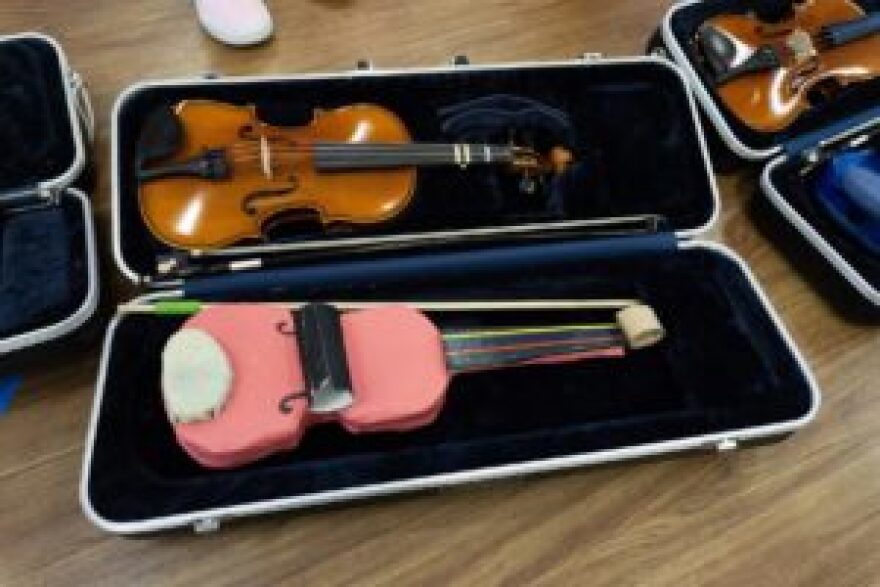Three dozen kindergarteners and first graders, accompanied by their guardians, wielded hot glue guns and cardboard cutouts of violins in the gym at Chapman Elementary School in Anchor Point.
Students were making three-dimensional papier-mâché instruments to paint and use to learn rhythm, finger positions and technique — and the equally important art of instrument care.
It’s the first time the elementary students at Chapman are learning how to play the violin at school, thanks to the nonprofit Homer OPUS, which expanded its violin program to the school last month with help from grants from Carnegie Hall, the Alaska State Council on the Arts and the Rasmuson Foundation.
The program is inspired by the El Sistema music program from Venezuela and it puts violins in the hands of young people, aiming to use music education as a vehicle for social change.
The school-based violin program has been active in Homer schools for about a decade, and Anchor Point parents say they’re happy to see the program expand to their own kids.
Five-year-old Jack O’Larey, a kindergartener at Chapman, was at the gym with his grandma Sandy last month for the instrument-making workshop. The dummy violins like the one he made will be these young students’ close companions over the next couple months.
Sandy was thrilled. She said she couldn’t find a violin teacher for Jack in Homer, a 15-mile car ride away.
“I think music is very important,” she said. “He’s been interested in music since he was about three and I don’t want him to lose that glow.”
Violin making was the first step in the school’s new program. Then, kindergarteners and first graders will get to know their cardboard violins. Next semester, they’ll get their own real wooden ones, which they’ll practice in class twice a week.
Clayton Holland is superintendent for the Kenai Peninsula Borough School District. He said the Homer OPUS program is inclusive of every student, regardless of ability or financial status.
“The difference it made in them and their confidence, leadership, their understanding
OPUS also runs violin programs at Fireweed Academy and Paul Banks Elementary in Homer, as well as after-school programs and an adult orchestra. Holland said a program like OPUS coming into schools is important, especially when school budgets are being cut across the state and nation.
Miranda Weiss agreed. She’s on the board of directors of Homer OPUS, and described cardboard violin-making day as “controlled chaos.”
She said the goal of OPUS is not to create professional musicians, but to instill cognitive and social skills in students.
“That's why we start with the youngest kids,” she said. “That's really what we're after, is helping kids become better learners and also better citizens. And then as they get older in the programs, we add skills and musicianship, and we're really fostering a lifelong love of music.”
That seems to have worked for students in Homer.
Sixteen-year-old Maggie Mae Gaylord started playing violin at age 4. Now, she plays with the Bayside Buskers, a youth ensemble composed mostly of current and former OPUS students. They’ve performed at the local Senior Center, hospital and animal shelter.
“For me, music is a community thing,” she said. “It's a way to connect with people and play music with friends, and also give back to the community.”
Abimael Melendez is OPUS’ new string program director. He grew up in Venezuela, where he fell in love with the violin, thanks to the El Sistema program.
“I was so dedicated, and at that moment I knew after high school I wanted to dedicate myself to music,” Melendez said.
Today, Melendez teaches violin to all ages, from kindergarteners in school music classes to 80-year-olds in the adult orchestra.
“We have a responsibility as teachers to go beyond in order to provide the best tools possible for the students and for the community,” he said. “We have a real responsibility as teachers to change lives.”
He said OPUS hopes to add second graders into the Chapman program next school year.





